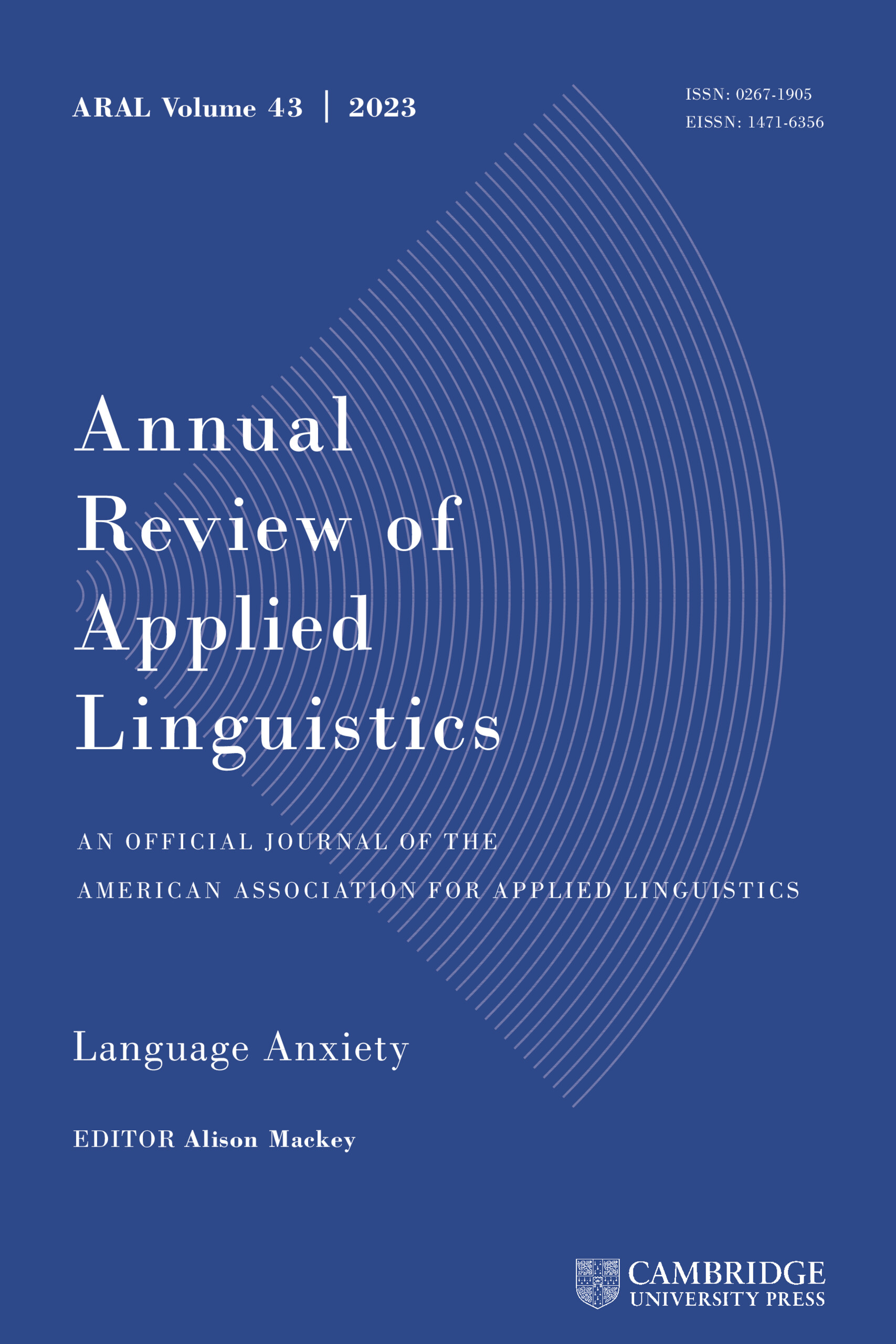Crossref Citations
This article has been cited by the following publications. This list is generated based on data provided by
Crossref.
De Kadt, Elizabeth
2004.
Gender aspects of the use of English on a South African university campus.
World Englishes,
Vol. 23,
Issue. 4,
p.
515.
McKenna, Bernard
2004.
Critical discourse studies: where to from here?.
Critical Discourse Studies,
Vol. 1,
Issue. 1,
p.
9.
Goebel, Zane
2005.
An Ethnographic Study of Code Choice in Two Neighbourhoods of Indonesia.
Australian Journal of Linguistics,
Vol. 25,
Issue. 1,
p.
85.
Leppänen, Sirpa
and
Nikula, Tarja
2007.
Diverse uses of English in Finnish society: Discourse-pragmatic insights into media, educational and business contexts.
mult,
Vol. 26,
Issue. 4,
p.
333.
MacPherson, Seonaigh
and
Ghoso, Dawa Bhuti
2008.
Multilingualism in Emerging Diasporas: A Tibetan Case Study.
Diaspora, Indigenous, and Minority Education,
Vol. 2,
Issue. 3,
p.
188.
Muchnik, Malka
2010.
Gender stereotypes in the language of Be my knife by David Grossman.
Text & Talk - An Interdisciplinary Journal of Language, Discourse & Communication Studies,
Vol. 30,
Issue. 5,
p.
553.
Thomas, Margaret
2013.
Otto Jespersen and “The Woman”, then and now.
Historiographia Linguistica,
Vol. 40,
Issue. 3,
p.
377.
Meek, Barbra A.
2014.
The Handbook of Language, Gender, and Sexuality.
p.
547.
Blaxter, Tam
2015.
Gender and language change in Old Norse sentential negatives.
Language Variation and Change,
Vol. 27,
Issue. 3,
p.
349.
Lev-Ari, Shiri
and
Peperkamp, Sharon
2017.
Language for $200: success in the environment influences grammatical alignment.
Journal of Language Evolution,
p.
lzw012.
Toolan, Michael
2018.
The Language of Inequality in the News.
Frieman, Catherine J.
Teather, Anne
and
Morgan, Chelsea
2019.
Bodies in Motion: Narratives and Counter Narratives of Gendered Mobility in European Later Prehistory.
Norwegian Archaeological Review,
Vol. 52,
Issue. 2,
p.
148.
Birchfield, Alexandra
and
Coto-Solano, Rolando
2021.
“I am not that I play” – The use of hypercorrection in the performance of gender by Shakespeare’s ‘breeches’ parts.
Journal of Historical Sociolinguistics,
Vol. 7,
Issue. 1,
p.
27.
Savoldi, Beatrice
Gaido, Marco
Bentivogli, Luisa
Negri, Matteo
and
Turchi, Marco
2021.
Gender Bias in Machine Translation.
Transactions of the Association for Computational Linguistics,
Vol. 9,
Issue. ,
p.
845.
Lorenz, Eliane
Hasai, Yevheniia
and
Siemund, Peter
2021.
Multilingual lexical transfer challenges monolingual educational norms: not quite!.
Multilingua,
Vol. 40,
Issue. 6,
p.
791.
Schubert, Tinka
Aguilar, Consol
Kim, Kyung Hi
and
Gómez, Aitor
2021.
Stop Blaming me for What Others Did to you: New Alternative Masculinity’s Communicative Acts Against Blaming Discourses.
Frontiers in Psychology,
Vol. 12,
Issue. ,
Goutsos, Dionysis
and
Fragaki, Georgia
2022.
Lexical choices of gender identity in Greek genres.
Pragmatics. Quarterly Publication of the International Pragmatics Association (IPrA),
p.
317.
Yasmine Falih Ahmed
2022.
الاختلاف في اللغة: الفروق الاكثر شيوعا بين لغة الذكور والاناث.
مجلة الفارابي للعلوم الانسانية,
Vol. 1,
Issue. 1,
p.
22.
2023.
The Effectiveness of Polite Language in Social Behavior.
British Journal of Arts and Humanities,
p.
1.
Marin-Conejo, Sergio
and
Lopez-Soto, Teresa
2023.
The Theory of Mind Under Scrutiny.
Vol. 34,
Issue. ,
p.
633.


